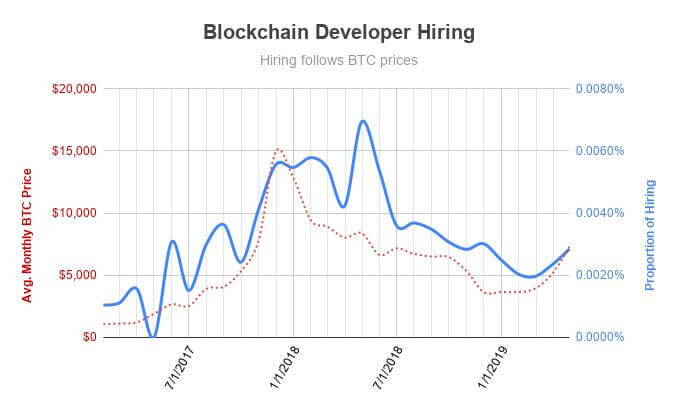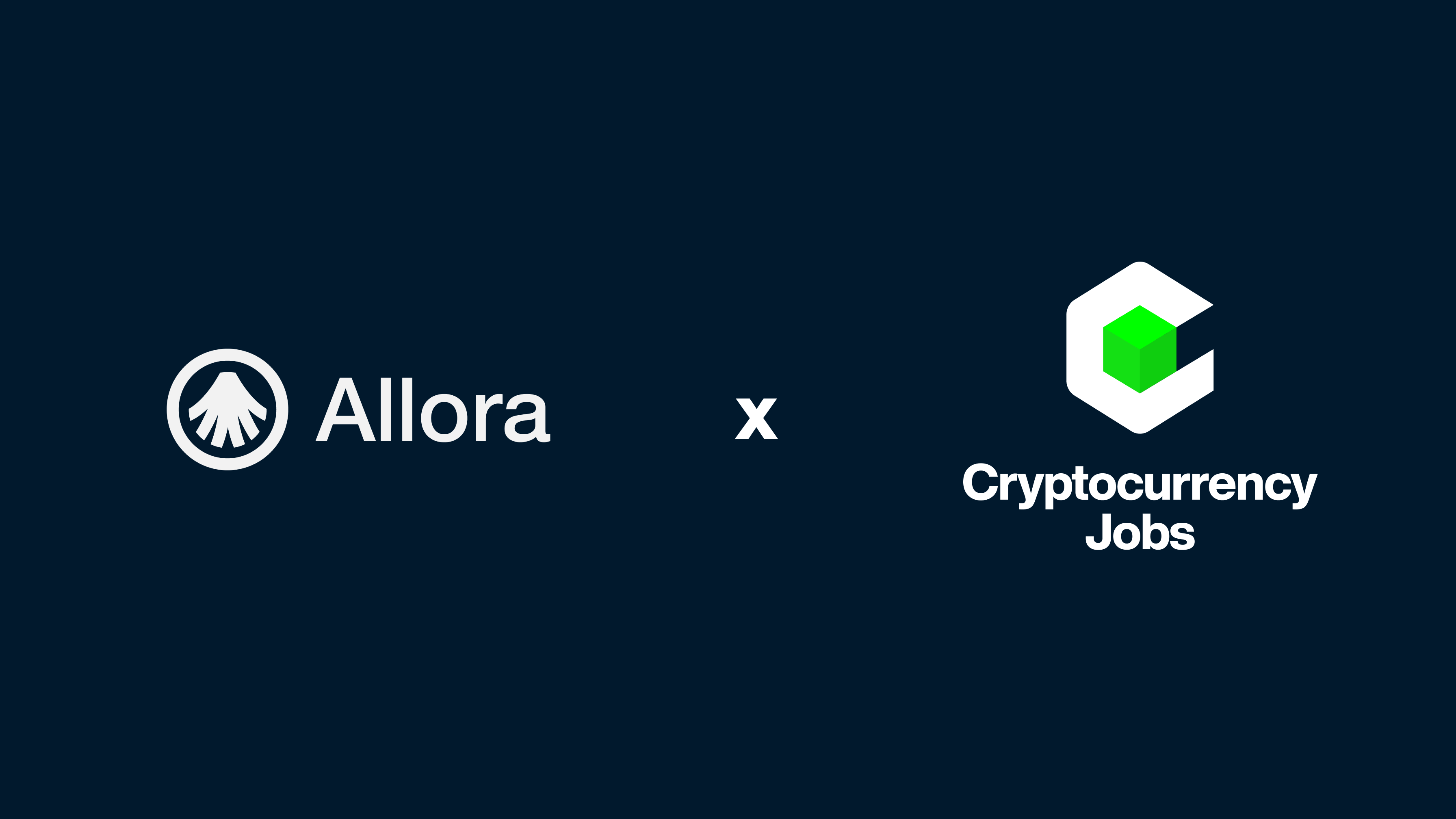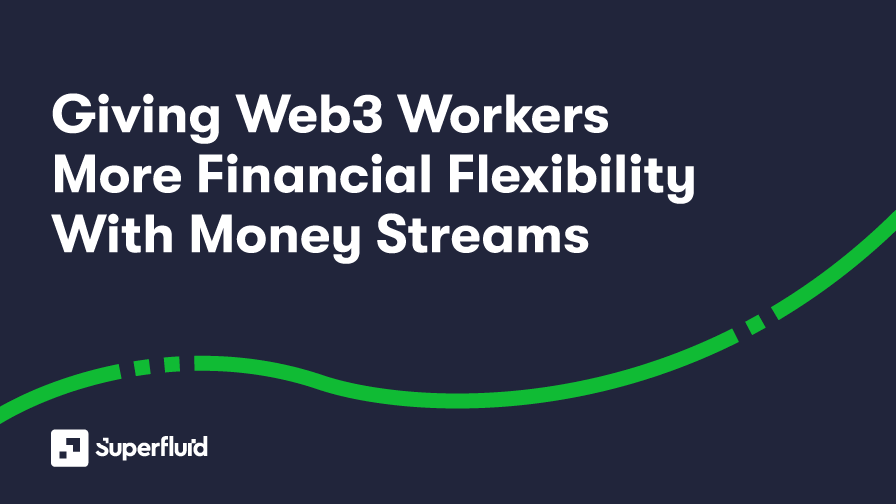The State of the Blockchain and Cryptocurrency Job Market in 2019
A volatile crypto market, high-profile layoffs, the creation of new blockchain jobs, the growth of DeFi, and increased awareness of Bitcoin.
By Cryptocurrency Jobs
9 min read

Last year, the crypto job market felt different, but overall it was a good different.
2019 was characterized by a volatile cryptocurrency market, a succession of high-profile layoffs, but also the creation of new blockchain jobs, the growth of Decentralized Finance, and increased awareness of Bitcoin.
Cryptocurrency layoffs
There were high-profile layoffs at cryptocurrency companies that began at the end of 2018 and continued throughout 2019.
The reasons cited for the layoffs were regulatory concerns, market conditions, and the need to streamline operations to refocus on profitability.
ConsenSys, a blockchain venture production studio, announced a strategy shift to streamline its business, which led to a 13 percent reduction in its team. Steemit, a blockchain-based social media platform, laid off 70 percent of its staff, and Shapeshift, a digital asset exchange, reduced the size of its team by a third.
In November 2019, New York-based blockchain analytics firm Chainalysis laid off 39 employees, about 20 percent of its workforce, and Circle reported layoffs in May and a new round in December.
At the end of December, Bottle Pay, a custodial bitcoin wallet provider, shut down operations in response to the EU’s Fifth Anti-Money Laundering Directive (5AMLD) that comes into effect on 10th January 2020. The 5AMLD introduces stricter regulatory controls across more sectors, including cryptocurrencies. Several other European firms have shut down in response to the new Directive.
Cryptocurrency mining company Bitmain closed its Israel-based research and development arm and laid off more than 50 percent of its employees. Recent reports suggest that Bitmain has plans to further reduce its workforce this year before the Bitcoin block reward halving that is likely to occur in May.
Many smaller firms also closed during the year.
Market volatility and cryptocurrencies
The volatility in cryptocurrency prices continues to affect the blockchain job market.
Devin Banerjee, a Senior Financial Services Editor at LinkedIn, plotted the proportion of new hires that are blockchain developers according to LinkedIn data, with the monthly price of bitcoin.

The data shows how the hiring market for blockchain developers tends to follow BTC prices.
In LinkedIn’s recent US Emerging Jobs Report, which identifies the top 15 jobs that have emerged over the last five years, Blockchain Developer, is no longer present. Last year, it topped the list.
The report cites that this “may not come as a surprise given the rapid decline in popularity of Bitcoin and other cryptocurrencies.”
As the Emerging Jobs analysis is based on LinkedIn members with a public profile, I should mention that many within the crypto space do not have a LinkedIn profile for security reasons, and several crypto profiles on the professional networking site are fake.
Scammers impersonating Binance team on LinkedIn: 1,500+ Binance actual team size: 600 Binance teams that actually have a profile on LinkedIn: 30
Welcome to #Crypto & LinkedIn
LinkedIn’s report is an interesting data point, but it does not reflect the overall state of the blockchain and crypto hiring market.
Based on Cryptocurrency Jobs data, despite the bear market and volatility in cryptocurrency prices, demand for blockchain talent and interest in working in the crypto space has remained strong throughout 2019.
Although the LinkedIn Report states that there has been a rapid decline in the popularity of Bitcoin and other cryptocurrencies, a survey conducted by The Harris Poll on behalf of Blockchain Capital presents a different picture:
Despite the bear market, the data shows that Bitcoin awareness, familiarity, perception, conviction, propensity to purchase and ownership all increased/improved significantly — dramatically in many cases.
The results highlight that Bitcoin is a demographic mega-trend led by younger age groups.
In Electric Capital’s Developer Report H1 2019, which focuses on developer activity from June 2018 to June 2019, the authors conclude:
- Despite market downturns in 2018, Full Time developers increased 13% year-over-year in June 2019 and are consolidating around high network value projects.
- Code commit volume is consistent but total monthly active developers are down 10% Y/Y.
- 80% of developer loss came from One Time per month and Part Time developers.
- The biggest developer drop-off came from projects outside of the Top 100 by network value.
- Smart Contracts, Infrastructure, and DeFi ecosystems continue to gain Full Time developers.
- Overall crypto ecosystems are approaching the size of well known open source projects such as Apache, but still has plenty of space to grow.
The crypto space is also global, and there has been much activity outside the US.
In LinkedIn’s Emerging Jobs 2020 report for India, Blockchain Developer tops the list of emerging jobs.
The country is seeing a rise in digital transactions, and therefore industries are ramping up investments in blockchain. This strong demand for blockchain tech talent puts ‘blockchain developer’ on top of the list.
Key findings from Cryptocurrency Jobs
During 2019, 1135 crypto and blockchain jobs at 472 companies and startups were posted on Cryptocurrency Jobs.
As in previous years, the crypto space continues to be dominated by engineering roles.
Here’s a breakdown of blockchain jobs distributed across roles:
- Customer Support: 7%
- Design: 10%
- Engineering: 31%
- Marketing: 13%
- Operations: 17%
- Other: 13%
- Sales: 9%
With the refocus on profitability and bringing products to market, there has been an increase in blockchain design, marketing, and sales roles.
Compliance, legal and regulatory related roles have also seen an increase in demand, which reflects the changing regulatory environment for cryptocurrency companies.
Regulators have also had to increase their digital asset teams.
During the year, the US Securities and Exchange Commission posted job openings for a Digital Asset Expert and a Securities Compliance Examiner (Blockchain Expert).
The US Federal Reserve has been looking to hire a manager to oversee its traditional payments section and research “digital currencies, stable coins, distributed ledger technologies, and broadly financial/digital innovation in retail payments.”
The major employers continue to be cryptocurrency exchanges. Research by The Block found that 42% of blockchain industry employees work for cryptocurrency exchanges, with another 10% for mining hardware manufacturers.
2019 was also the year of Decentralized Finance (DeFi). The explosive growth in DeFi contributed to many new job openings.
Most crypto job opportunities are in San Francisco and New York. In Europe, the main hubs are London and Berlin, and in Asia, it’s Singapore and Hong Kong. In Latin America, it’s Buenos Aires.
An exciting trend in 2019 was the increase in crypto job opportunities in Africa.
Many will be looking at Africa this year as Jack Dorsey, CEO of Square Crypto and Twitter, has announced plans to move temporarily to the continent following a month-long visit to entrepreneurs.
Sad to be leaving the continent…for now. Africa will define the future (especially the bitcoin one!). Not sure where yet, but I’ll be living here for 3-6 months mid 2020. Grateful I was able to experience a small part.
The cryptocurrency job market is maturing
In addition to the growth in blockchain job openings, another sign that the crypto industry has matured is the high-profile executives that have entered the space.
During 2019, there were many notable hires from Wall Street, the tech industry, government, and beyond.
- Coinbase hired LJ Brock as Chief People Officer from Citadel
- Cred hired Joe Podulka, a former PayPal executive as its Chief Financial Officer
- Bakkt hired Erik Haas, who previously headed the regulation department at ICE, as Director of Compliance
- Tradewind Markets hired Leon Shklar, a former Managing Director of Technology at BNY Mellon, as its Chief Technology Officer
- Amber Group hired Jeffrey Wang, a former Head of Derivatives Trading for Asia at Morgan Stanley
- Square Crypto hired former Google Director Steve Lee as Head of its newly formed team
- Gemini hired Julian Sawyer, former co-founder and Chief Operating Officer at Starling Bank, to manage its European operations
- C Labs hired Jai Ramaswamy, former Head of Enterprise Risk Management at Capital One, to head up its global regulatory, risk and compliance matters
- Blockchain hired Howard Surlof, former Deputy General Counsel of Blackrock and Global Chief Operating Officer of Blackrock’s iShares and Index business, as General Counsel.
Crypto optimism
Since I launched Cryptocurrency Jobs in 2017, I’ve interacted with and helped many people that want to transition into the crypto space.
Despite the bear market, company layoffs, and uncertainty in the space, job seekers remain optimistic. From the high school teacher to the corporate professional to the undergraduate, they’re all looking for an opportunity to join the crypto industry.
Although they express many reasons for why they want a career in crypto, a common factor is that it presents them with the opportunity to work on something that has never been done before; to build a better system, a decentralized future.
You must work on something that inspires you and others, you must work on something with a significant impact, and you must do it in a way that makes getting where you want to go as easy as possible and keeps you there as long as possible.
Unfortunately, two common myths continue to come up in my conversations with job seekers that I want to dispel.
You don’t need to be a developer to work in this space. Over 40 percent of jobs on Cryptocurrency Jobs are non-technical.
You also don’t need prior blockchain work experience. Although some companies require previous experience, many are more interested in your prior work experience and that you are passionate about working in the space. This is true across roles.
If you are interested in working in crypto, please apply. Do not self-reject.
A call for internships and entry-level opportunities
There are still too few entry-level roles and internships available.
With the rise of crypto in higher education and the recognition that Bitcoin is a demographic mega-trend led by younger age groups, there need to be more job opportunities for these young, creative, and talented individuals.
In 2020, I’d love to see more entry-level and internship opportunities across roles, ideally, which are remote so everyone can apply.
If you’re hiring interns or offer entry-level opportunities get in touch, and I will help you.
While it’s still early days, I’m excited about cryptocurrency and what’s possible as more talented people of all demographics and backgrounds from around the world join forces and leave their mark on this space.
If you are currently hiring or plan to do so this year, get in touch as I want to help you grow your team.

- Name
- Cryptocurrency Jobs
I'm Daniel, the founder of Cryptocurrency Jobs. My mission is to bring talented humans together to help build our decentralized future.
More stories

8 Years of Cryptocurrency Jobs
Reflecting on the people, projects, and quiet impact that have shaped this journey.

Cryptocurrency Jobs Becomes a Node Operator on the Allora Network
We are thrilled to announce that Cryptocurrency Jobs will be joining the Allora Network as a validator node, marking an important milestone for both of the projects.

Giving Web3 Workers More Financial Flexibility With Money Streams
When you work in crypto, it makes sense to get paid in crypto. But it makes even more sense to get paid in crypto "money streams."